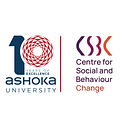the changelog
Volume 2, Issue 1 | January 2023
As we enter 2023, our main priority at the Centre for Social and Behaviour Change is to remain intentional in our work, in line with our ultimate goal of research for impact. By being deliberate about the sectors and scope of our projects, we will continue to create value for the communities we work for and the field of behaviour science.
So far, we have amplified and applied evidence to drive better outcomes related to health, water, financial inclusion, sustainability, and rural livelihoods. We successfully competed for funding to study vaccine hesitancy in rural India and grievance redressal among women who use digital financial services. We are also proud to have launched our Pop-UP lab, the first-of-its-kind mobile lab in UP.
Going into 2023, we will continue to take our learnings to changemakers across government and academia to multiply our impact. We have already begun scaling up our interventions to increase IFA uptake through Behavioural Insights Units embedded in the government. Our team in Bihar worked closely with the State Rural Livelihoods Mission to scale up a kit to promote the uptake of the COVID-19 vaccine, mask-wearing and other safety behaviours. The JEEViKA team covered over 7 million women with the kit during SHG meetings. A survey of a sample of these women found that many accurately recalled the contents of the kit, and the majority took the vaccine citing the recommendation as one of their top reasons. Our research has also been published in several academic journals and presented at conferences worldwide.
More of our most exciting achievements from 2022 are shared below. We will keep this momentum going in 2023, and design and advocate for more evidence-based interventions and conduct more formative research.
Our researchers published in several academic journals, including Health Communication, Vaccine: X, and Reproductive Health. Other publications include a white paper, a landscape analysis, and opinion articles. We launched our working paper series in 2022, and in the spirit of open access, we shared raw data from completed projects and extensive codebooks to explain each variable in the data files. Finally, we initiated the changelog, our bi-monthly newsletter.
Our behavioural scientists taught an online professional certificate programme, How to Change a Life, which was co-created with AshokaX. The course introduced students to behavioural science concepts and applications that could be used to change individual and community behaviour. We conducted a seminar series, Constructing Stories for Behaviour Change, which took a closer look at narratives and how they become instruments of behaviour change. Finally, in collaboration with CSIR-CSIO, CSBC co-hosted the Summer Institute for Computational Social Science, a week-long programme for PhD candidates, junior faculty, and young professionals. The summer school involved lectures and hands-on tutorials by global and Indian faculty on digital data, ML, crowdsourcing, experiments and ethics, culminating in individual research projects.
CSBC signed an MoU with Tata Trusts for work on the Jal Jeevan Mission (JJM). Under this, we identified behaviour change strategies within the programme. Our Behavioural Insights Unit of India at NITI Aayog, established by CSBC, BMGF and NITI Aayog, published a diagnostic report on ‘Behavioural Barriers and Levers in JJM’ with the Department of Drinking Water and Sanitation, Ministry of Jal Shakti. The NITI-BIU also published a report on ‘Behaviour Change in Public Policy’ in collaboration with the Development Monitoring and Evaluation Office (DMEO) and led the global call for ideas and papers under ‘Lifestyle for Environment (LiFE)’, a global movement by the Government of India that aims to drive climate action through behaviour change. Finally, we extended our MoU with Dvara Health Finance. We will design and test behaviour science-backed interventions to increase the take-up and usage of their health finance services.
Our researchers spoke at several national and international platforms, including the UN Young Changemakers Conclave, Financial Inclusion Week, Moonshot, and the Rural WaSH Partners Forum. We presented our research at the Sabin Social and Behavioral Research Grant Partner Coalition Meeting, the Learning Collaborative Strategy Summit, International Conference on Social Dilemmas and the Behavioral Research in Economics Workshop. We were invited to speak at leading academic institutions like LBSNAA, LSE, ICMR, IEG, ISB, IIM Calcutta, IIT Jodhpur and the University of Copenhagen. CSBC also organised many in-person and virtual discussions with experts like Dr Michael Kremer, Dr Ravi Dhar, Amitabh Kant, Parameswaran Iyer, and others.
We launched the CSBC Colloquium, our flagship in-person speaker series, in December 2022. Our first speaker was Ms Manjari Jaruhar, IPS, who spoke about her journey of navigating hierarchy and the patriarchy as the first woman officer of the Bihar IPS cadre. She also shared insights on achieving excellence in a male-dominated space. We are excited to interact with pioneers from various sectors through this series in the coming months.
Follow us on LinkedIn, Twitter, and Facebook for more, and sign up for our newsletter here.
